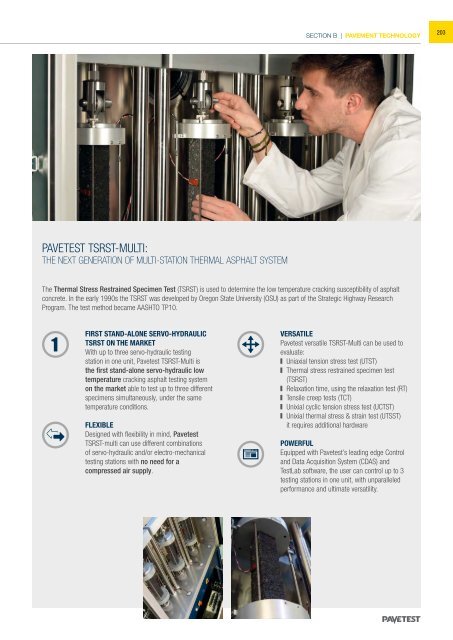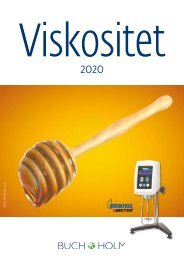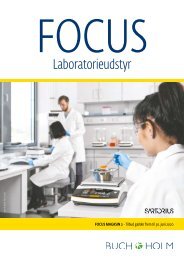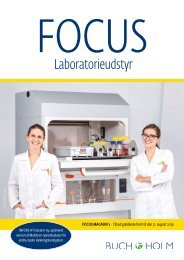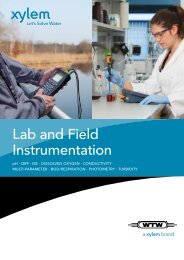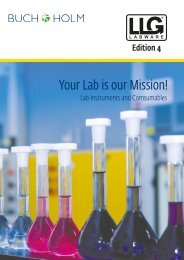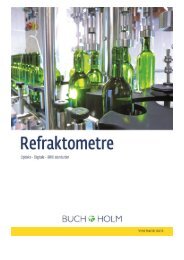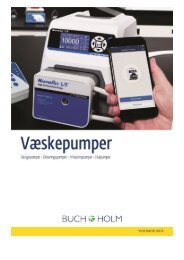- Page 1 and 2:
CATALOGUE 2018 10th Edition
- Page 3 and 4:
...Because of our ability to consta
- Page 5 and 6:
THE LATEST OUTCOMES OF OUR RESEARCH
- Page 7 and 8:
#GLOBALPRESENCE Strong participatio
- Page 9 and 10:
A 32 YEARS JOURNEY INTO MANUFACTURI
- Page 11 and 12:
Silent. Stilysh. Standout. An inver
- Page 13 and 14:
EMBRACING A CULTURE OF TESTING.
- Page 15 and 16:
Triaxlab Automated System Cyclic Tr
- Page 17 and 18:
INDEX SECTION AA | Software Utm2 18
- Page 19:
SECTION AA | SOFTWARE UTM2 19 Gener
- Page 22 and 23:
22 SECTION A | AGGREGATES - ROCKS G
- Page 24 and 25:
24 SECTION A | AGGREGATES - ROCKS H
- Page 26 and 27:
26 SECTION A | AGGREGATES - ROCKS C
- Page 28 and 29:
28 SECTION A | AGGREGATES - ROCKS C
- Page 30 and 31:
30 SECTION A | AGGREGATES - ROCKS A
- Page 32 and 33:
32 SECTION A | AGGREGATES - ROCKS B
- Page 34 and 35:
34 SECTION A | AGGREGATES - ROCKS T
- Page 36 and 37:
36 SECTION A | AGGREGATES - ROCKS W
- Page 38 and 39:
38 SECTION A | AGGREGATES - ROCKS A
- Page 40 and 41:
40 SECTION A | AGGREGATES - ROCKS E
- Page 42 and 43:
42 SECTION A | AGGREGATES - ROCKS A
- Page 44 and 45:
44 SECTION A | AGGREGATES - ROCKS A
- Page 46 and 47:
46 SECTION A | AGGREGATES - ROCKS A
- Page 48 and 49:
48 SECTION A | AGGREGATES - ROCKS A
- Page 50 and 51:
50 SECTION A | AGGREGATES - ROCKS S
- Page 52 and 53:
52 SECTION A | AGGREGATES - ROCKS S
- Page 54 and 55:
54 SECTION A | AGGREGATES - ROCKS D
- Page 56 and 57:
56 SECTION A | AGGREGATES - ROCKS A
- Page 58 and 59:
58 SECTION A | AGGREGATES - ROCKS A
- Page 60 and 61:
60 SECTION A | AGGREGATES - ROCKS A
- Page 62 and 63:
62 SECTION A | AGGREGATES - ROCKS D
- Page 64 and 65:
64 SECTION A | AGGREGATES - ROCKS A
- Page 66 and 67:
66 SECTION A | AGGREGATES - ROCKS C
- Page 68 and 69:
68 SECTION A | AGGREGATES - ROCKS A
- Page 70 and 71:
70 SECTION A | AGGREGATES - ROCKS T
- Page 72 and 73:
72 SECTION A | AGGREGATES - ROCKS A
- Page 75 and 76:
SECTION B ASPHALT | BITUMEN | PAVET
- Page 77 and 78:
SECTION B | ASPHALT 77 The unit con
- Page 79 and 80:
SECTION B | ASPHALT 79 B005 BITUMEN
- Page 81 and 82:
SECTION B | ASPHALT 81 B014 CONTINU
- Page 83 and 84:
SECTION B | ASPHALT 83 B018 BINDER
- Page 85 and 86:
SECTION B | ASPHALT 85 B067A AUTORI
- Page 87 and 88:
SECTION B | ASPHALT 87 INDENTATION
- Page 89 and 90:
SECTION B | ASPHALT 89 B114 ASPHALT
- Page 91 and 92:
SECTION B | ASPHALT 91 MIXERS 20 AN
- Page 93 and 94:
SECTION B | ASPHALT 93 The Pavemix
- Page 95 and 96:
SECTION B | ASPHALT 95 B033N AUTOMA
- Page 97 and 98:
SECTION B | ASPHALT 97 B030 KIT MAR
- Page 99 and 100:
SECTION B | ASPHALT 99 GYROTRONIC -
- Page 101 and 102:
SECTION B | ASPHALT 101 GYROTRONIC
- Page 103 and 104:
SECTION B | ASPHALT 103 AVAILABLE M
- Page 105 and 106:
SECTION B | ASPHALT 105 B041-28 GAM
- Page 107 and 108:
SECTION B | ASPHALT 107 B039 ARC AS
- Page 109 and 110:
SECTION B | ASPHALT 109 ACCESSORIES
- Page 111 and 112:
SECTION B | ASPHALT 111 TECHNICAL S
- Page 113 and 114:
SECTION B | ASPHALT 113 HARDWARE Da
- Page 115 and 116:
SECTION B | ASPHALT 115 B038A SMART
- Page 117 and 118:
SECTION B | ASPHALT 117 TABLE OF AC
- Page 119 and 120:
SECTION B | ASPHALT 119 THE NEXT GE
- Page 121 and 122:
SECTION B | ASPHALT 121 B042 KIT MA
- Page 123 and 124:
SECTION B | ASPHALT 123 Note: The D
- Page 125 and 126:
SECTION B | ASPHALT 125 MULTIFUNCTI
- Page 127 and 128:
SECTION B | ASPHALT 127 SPECIFIC AP
- Page 129 and 130:
SECTION B | ASPHALT 129 S205N UNITR
- Page 131 and 132:
SECTION B | ASPHALT 131 SPECIFIC AP
- Page 133 and 134:
SECTION B | ASPHALT 133 B044N-SET i
- Page 135 and 136:
SECTION B | ASPHALT 135 B052 DIGITA
- Page 137 and 138:
SECTION B ASPHALT | BITUMEN | PAVET
- Page 139 and 140:
SECTION B | BITUMEN 139 TECHNICAL S
- Page 141 and 142:
SECTION B | BITUMEN 141 B056-01 KIT
- Page 143 and 144:
SECTION B | BITUMEN 143 B063-10 PAR
- Page 145 and 146:
SECTION B | BITUMEN 145 B055-10 DUC
- Page 147 and 148:
SECTION B | BITUMEN 147 B075 WATER
- Page 149 and 150:
SECTION B | BITUMEN 149 B064 KIT RO
- Page 151 and 152: SECTION B | BITUMEN 151 B070N1 SOFT
- Page 153 and 154: SECTION B | BITUMEN 153 B080 ENGLER
- Page 155 and 156: SECTION B | BITUMEN 155 B092 KIT TA
- Page 157 and 158: SECTION B | BITUMEN 157 B085-07N DS
- Page 159 and 160: SECTION B | BITUMEN 159 B091M-01 VD
- Page 161 and 162: SECTION B | BITUMEN 161 B085-29 BAT
- Page 163 and 164: SECTION B | BITUMEN 163 KINEMATIC V
- Page 165 and 166: SECTION B | BITUMEN 165 B098N TRAVE
- Page 167 and 168: SECTION B | BITUMEN 167 B103-10 BEA
- Page 169 and 170: SECTION B ASPHALT | BITUMEN | PAVET
- Page 171 and 172: SECTION B | PAVEMENT TECHNOLOGY 171
- Page 173 and 174: SECTION B | PAVEMENT TECHNOLOGY 173
- Page 175 and 176: SECTION B | PAVEMENT TECHNOLOGY 175
- Page 177 and 178: SECTION B | PAVEMENT TECHNOLOGY 177
- Page 179 and 180: SECTION B | PAVEMENT TECHNOLOGY 179
- Page 181 and 182: SECTION B | PAVEMENT TECHNOLOGY 181
- Page 183 and 184: SECTION B | PAVEMENT TECHNOLOGY 183
- Page 185 and 186: SECTION B | PAVEMENT TECHNOLOGY 185
- Page 187 and 188: SECTION B | PAVEMENT TECHNOLOGY 187
- Page 189 and 190: SECTION B | PAVEMENT TECHNOLOGY 189
- Page 191 and 192: SECTION B | PAVEMENT TECHNOLOGY 191
- Page 193 and 194: SECTION B | PAVEMENT TECHNOLOGY 193
- Page 195 and 196: SECTION B | PAVEMENT TECHNOLOGY 195
- Page 197 and 198: SECTION B | PAVEMENT TECHNOLOGY 197
- Page 199 and 200: SECTION B | PAVEMENT TECHNOLOGY 199
- Page 201: SECTION B | PAVEMENT TECHNOLOGY 201
- Page 205 and 206: SECTION B | PAVEMENT TECHNOLOGY 205
- Page 207 and 208: SECTION B | PAVEMENT TECHNOLOGY 207
- Page 209 and 210: SECTION B | PAVEMENT TECHNOLOGY 209
- Page 211 and 212: SECTION B | PAVEMENT TECHNOLOGY 211
- Page 213: SECTION B | PAVEMENT TECHNOLOGY 213
- Page 216 and 217: 216 SECTION C | CONCRETE COMPRESSIO
- Page 218 and 219: 218 SECTION C | CONCRETE LOAD MEASU
- Page 220 and 221: 220 SECTION C | CONCRETE SPECIFICAT
- Page 222 and 223: 222 SECTION C | CONCRETE ULTIMATE D
- Page 224 and 225: 224 SECTION C | CONCRETE C109N CYBE
- Page 226 and 227: 226 SECTION C | CONCRETE Internet d
- Page 228 and 229: 228 SECTION C | CONCRETE MODELS C10
- Page 230 and 231: 230 SECTION C | CONCRETE COMPRESSIO
- Page 232 and 233: 232 SECTION C | CONCRETE ACCESSORIE
- Page 234 and 235: 234 SECTION C | CONCRETE COMPRESSIO
- Page 236 and 237: 236 SECTION C | CONCRETE ACCESSORIE
- Page 238 and 239: 238 SECTION C | CONCRETE COMPRESSIO
- Page 240 and 241: 240 SECTION C | CONCRETE ACCESSORIE
- Page 242 and 243: 242 SECTION C | CONCRETE COMPRESSIO
- Page 244 and 245: 244 SECTION C | CONCRETE ACCESSORIE
- Page 246 and 247: 246 SECTION C | CONCRETE COMPRESSIO
- Page 248 and 249: 248 SECTION C | CONCRETE ACCESSORIE
- Page 250 and 251: 250 SECTION C | CONCRETE COMPRESSIO
- Page 252 and 253:
252 SECTION C | CONCRETE ACCESSORIE
- Page 254 and 255:
254 SECTION C | CONCRETE COMPRESSIO
- Page 256 and 257:
256 SECTION C | CONCRETE ACCESSORIE
- Page 258 and 259:
258 SECTION C | CONCRETE COMPRESSIO
- Page 260 and 261:
260 SECTION C | CONCRETE COMPRESSIO
- Page 262 and 263:
262 SECTION C | CONCRETE COMPRESSIO
- Page 264 and 265:
264 SECTION C | CONCRETE ACCESSORIE
- Page 266 and 267:
266 SECTION C | CONCRETE COMPRESSIO
- Page 268 and 269:
268 SECTION C | CONCRETE ACCESSORIE
- Page 270 and 271:
270 SECTION C | CONCRETE COMPRESSIO
- Page 272 and 273:
272 SECTION C | CONCRETE ACCESSORIE
- Page 274 and 275:
274 SECTION C | CONCRETE COMPRESSIO
- Page 276 and 277:
276 SECTION C | CONCRETE ACCESSORIE
- Page 278 and 279:
278 SECTION C | CONCRETE COMPRESSIO
- Page 280 and 281:
280 SECTION C | CONCRETE COMPRESSIO
- Page 282 and 283:
282 SECTION C | CONCRETE SERVO-STRA
- Page 284 and 285:
284 SECTION C | CONCRETE C125N DETE
- Page 286 and 287:
286 SECTION C | CONCRETE DETERMINAT
- Page 288 and 289:
288 SECTION C | CONCRETE FLEXURE TE
- Page 290 and 291:
290 SECTION C | CONCRETE FLEXURAL T
- Page 292 and 293:
292 SECTION C | CONCRETE FLEXURAL T
- Page 294 and 295:
294 SECTION C | CONCRETE FLEXURAL F
- Page 296 and 297:
296 SECTION C | CONCRETE C095N FLEX
- Page 298 and 299:
298 SECTION C | CONCRETE C095N SPEC
- Page 300 and 301:
300 SECTION C | CONCRETE C096N HIGH
- Page 302 and 303:
302 SECTION C | CONCRETE C096N SPEC
- Page 304 and 305:
304 SECTION C | CONCRETE FIBER REIN
- Page 306 and 307:
306 SECTION C | CONCRETE ENERGY ABS
- Page 308 and 309:
308 SECTION C | CONCRETE UNIVERSAL
- Page 310 and 311:
310 SECTION C | CONCRETE UPGRADING
- Page 312 and 313:
312 SECTION C | CONCRETE C104-03N S
- Page 314 and 315:
2 SECTION C | CONCRETE C104-03P KIT
- Page 316 and 317:
314 SECTION C | CONCRETE ACCESSORIE
- Page 318 and 319:
316 SECTION C | CONCRETE ACCESSORIE
- Page 320 and 321:
318 SECTION C | CONCRETE ACCESSORIE
- Page 322 and 323:
320 SECTION C | CONCRETE ACCESSORIE
- Page 324 and 325:
322 SECTION C | CONCRETE S206N UNIT
- Page 326 and 327:
324 SECTION C | CONCRETE ABRASION M
- Page 328 and 329:
326 SECTION C | CONCRETE C138N UNIV
- Page 330 and 331:
328 SECTION C | CONCRETE TURBO FORC
- Page 332 and 333:
330 SECTION C | CONCRETE TESTING FR
- Page 334 and 335:
332 SECTION C | CONCRETE SLUMP CONE
- Page 336 and 337:
334 SECTION C | CONCRETE C187 K-SLU
- Page 338 and 339:
336 SECTION C | CONCRETE C195 AIR E
- Page 340 and 341:
338 SECTION C | CONCRETE CONCRETE F
- Page 342 and 343:
340 SECTION C | CONCRETE PLASTIC CU
- Page 344 and 345:
342 SECTION C | CONCRETE STEEL CUBE
- Page 346 and 347:
344 SECTION C | CONCRETE VIBRATING
- Page 348 and 349:
346 SECTION C | CONCRETE CURING TAN
- Page 350 and 351:
348 SECTION C | CONCRETE CLIMATIC C
- Page 352 and 353:
350 SECTION C | CONCRETE UNBONDED C
- Page 354 and 355:
352 SECTION C | CONCRETE C299 AUTOM
- Page 356 and 357:
354 SECTION C | CONCRETE C377 MICRO
- Page 358 and 359:
356 SECTION C | CONCRETE CORE DRILL
- Page 360 and 361:
358 SECTION C | CONCRETE C348T SPEC
- Page 362 and 363:
360 SECTION C | CONCRETE FLAT JACKS
- Page 364 and 365:
362 SECTION C | CONCRETE TESTING OF
- Page 366 and 367:
364 SECTION C | CONCRETE C374 MOIST
- Page 368 and 369:
366 SECTION C | CONCRETE RAPID CHLO
- Page 370 and 371:
368 SECTION C | CONCRETE REBOUND CO
- Page 372 and 373:
370 SECTION C | CONCRETE C393 RESON
- Page 374 and 375:
372 SECTION C | CONCRETE C372M ULTR
- Page 376 and 377:
374 SECTION C | CONCRETE COVER TO R
- Page 378 and 379:
376 SECTION C | CONCRETE C410 WINDS
- Page 380 and 381:
378 SECTION C | CONCRETE DEFLECTOME
- Page 382 and 383:
380 SECTION C | CONCRETE WATER IMPE
- Page 385 and 386:
SECTION E CEMENT - MORTAR The raw m
- Page 387 and 388:
SECTION E | CEMENT - MORTAR 385 E01
- Page 389 and 390:
SECTION E | CEMENT - MORTAR 387 E09
- Page 391 and 392:
SECTION E | CEMENT - MORTAR 389 E05
- Page 393 and 394:
SECTION E | CEMENT - MORTAR 391 PRO
- Page 395 and 396:
SECTION E | CEMENT - MORTAR 393 E04
- Page 397 and 398:
SECTION E | CEMENT - MORTAR 395 E06
- Page 399 and 400:
SECTION E | CEMENT - MORTAR 397 E10
- Page 401 and 402:
SECTION E | CEMENT - MORTAR 399 E08
- Page 403 and 404:
SECTION E | CEMENT - MORTAR 401 FLO
- Page 405 and 406:
SECTION E | CEMENT - MORTAR 403 E09
- Page 407 and 408:
SECTION E | CEMENT - MORTAR 405 E09
- Page 409 and 410:
SECTION E | CEMENT - MORTAR 407 Dra
- Page 411 and 412:
SECTION E | CEMENT - MORTAR 409 E13
- Page 413 and 414:
SECTION E | CEMENT - MORTAR 411 E13
- Page 415 and 416:
SECTION E | CEMENT - MORTAR 413 C10
- Page 417 and 418:
SECTION E | CEMENT - MORTAR 415 MAI
- Page 419 and 420:
SECTION E | CEMENT - MORTAR 417 S20
- Page 421 and 422:
SECTION E | CEMENT - MORTAR 419 MAC
- Page 423 and 424:
SECTION E | CEMENT - MORTAR 421 H00
- Page 425 and 426:
SECTION E | CEMENT - MORTAR 423 COM
- Page 427 and 428:
SECTION E | CEMENT - MORTAR 425 H00
- Page 429 and 430:
SECTION E | CEMENT - MORTAR 427 ACC
- Page 431 and 432:
SECTION E | CEMENT - MORTAR 429 COM
- Page 433:
SECTION E | CEMENT - MORTAR 431 The
- Page 436 and 437:
434 SECTION H | STEEL UNIVERSAL AUT
- Page 438 and 439:
436 SECTION H | STEEL CONTROL SYSTE
- Page 440 and 441:
438 SECTION H | STEEL H001BS with a
- Page 442 and 443:
440 SECTION H | STEEL H003N UNIVERS
- Page 444 and 445:
442 SECTION H | STEEL SERVO-CONTROL
- Page 446 and 447:
444 SECTION H | STEEL ACCESSORIES F
- Page 448 and 449:
446 SECTION H | STEEL UNIVERSAL TEN
- Page 450 and 451:
448 SECTION H | STEEL ACCESSORIES f
- Page 452 and 453:
450 SECTION H | STEEL H017 UNIVERSA
- Page 454 and 455:
452 SECTION H | STEEL S205-05N UNIT
- Page 456 and 457:
454 SECTION H | STEEL H065N COLD BE
- Page 458 and 459:
456 SECTION H | STEEL PENDULUM IMPA
- Page 461 and 462:
SECTION S SOIL For the implementati
- Page 463 and 464:
SECTION S | SOIL 461 S051-01 S052KI
- Page 465 and 466:
SECTION S | SOIL 463 SURFACE SOIL S
- Page 467 and 468:
SECTION S | SOIL 465 S086 LOAD RING
- Page 469 and 470:
SECTION S | SOIL 467 S059-10 ELECTR
- Page 471 and 472:
SECTION S | SOIL 469 S132N COLOR ST
- Page 473 and 474:
SECTION S | SOIL 471 S118 SOIL DIE
- Page 475 and 476:
SECTION S | SOIL 473 A028 UNIVERSAL
- Page 477 and 478:
SECTION S | SOIL 475 S143 KIT PARTI
- Page 479 and 480:
SECTION S | SOIL 477 S159 KIT SAND
- Page 481 and 482:
SECTION S | SOIL 479 SPECIFIC GRAVI
- Page 483 and 484:
SECTION S | SOIL 481 S175 SHRINKAGE
- Page 485 and 486:
SECTION S | SOIL 483 B057-02 S165-0
- Page 487 and 488:
SECTION S | SOIL 485 PROCTOR RAMMER
- Page 489 and 490:
SECTION S | SOIL 487 AUTOMATIC PROC
- Page 491 and 492:
SECTION S | SOIL 489 Description St
- Page 493 and 494:
SECTION S | SOIL 491 STRENGTH OF ST
- Page 495 and 496:
SECTION S | SOIL 493 CALIFORNIA BEA
- Page 497 and 498:
SECTION S | SOIL 495 MULTIFUNCTION
- Page 499 and 500:
SECTION S | SOIL 497 S215A with CBR
- Page 501 and 502:
SECTION S | SOIL 499 B044N-SET is c
- Page 503 and 504:
SECTION S | SOIL 501 FIRMWARE Elect
- Page 505 and 506:
SECTION S | SOIL 503 S205N | S205-0
- Page 507 and 508:
SECTION S | SOIL 505 AUTO SCB SEMI-
- Page 509 and 510:
SECTION S | SOIL 507 FLEXURAL TEST
- Page 511 and 512:
SECTION S | SOIL 509 FIRMWARE Elect
- Page 513 and 514:
SECTION S | SOIL 511 S206N UNITRONI
- Page 515 and 516:
SECTION S | SOIL 513 PUNCHING TEST
- Page 517 and 518:
SECTION S | SOIL 515 S223 KIT PLATE
- Page 519 and 520:
SECTION S | SOIL 517 S226 KIT PLATE
- Page 521 and 522:
SECTION S | SOIL 519 S224-02 KIT DI
- Page 523 and 524:
SECTION S | SOIL 521 S228N DYNAMIC
- Page 525 and 526:
SECTION S | SOIL 523 S230 KIT ASTM
- Page 527 and 528:
SECTION S | SOIL 525 BS SAND REPLAC
- Page 529 and 530:
SECTION S | SOIL 527 S248 PERMEAMET
- Page 531 and 532:
SECTION S | SOIL 529 CONSOLIDATION
- Page 533 and 534:
SECTION S | SOIL 531 S260-05N SOFTW
- Page 535 and 536:
SECTION S | SOIL 533 S262N EDOTRONI
- Page 537 and 538:
SECTION S | SOIL 535 MODULARITY TES
- Page 539 and 540:
SECTION S | SOIL 537 THE DIRECT/RES
- Page 541 and 542:
SECTION S | SOIL 539 S277-40N SOFTW
- Page 543 and 544:
SECTION S | SOIL 541 FIRMWARE Simil
- Page 545 and 546:
SECTION S | SOIL 543 TRIAXIAL TESTS
- Page 547 and 548:
SECTION S | SOIL 545 S301-02 TRIAXI
- Page 549 and 550:
SECTION S | SOIL 547 ACCESSORIES RU
- Page 551 and 552:
SECTION S | SOIL 549 MEASURE OF THE
- Page 553 and 554:
SECTION S | SOIL 551 PRESSURE SYSTE
- Page 555 and 556:
SECTION S | SOIL 553 MEASURE OF VOL
- Page 557 and 558:
SECTION S | SOIL 555 RECOMMENDED TY
- Page 559 and 560:
SECTION S | SOIL 557 RECOMMENDED TY
- Page 561 and 562:
SECTION S | SOIL 559 AUTOMATIC DATA
- Page 563 and 564:
SECTION S | SOIL 561 TRIAXLAB AUTOM
- Page 565 and 566:
SECTION S | SOIL 563 TRIAXLAB AUTOM
- Page 567 and 568:
SECTION S | SOIL 565 S349 PRESSUREM
- Page 569 and 570:
SECTION S | SOIL 567 CYCLIC TRIAXLA
- Page 571 and 572:
SECTION S | SOIL 569 CYCLIC TRIAXLA
- Page 573 and 574:
SECTION S | SOIL 571 TESTLAB, USER
- Page 575 and 576:
SECTION S | SOIL 573 LOAD PROVING R
- Page 577:
SECTION S | SOIL 575 OUR CLIENTS AR
- Page 580 and 581:
578 SECTION V | GENERAL EQUIPMENT M
- Page 582 and 583:
580 SECTION V | GENERAL EQUIPMENT E
- Page 584 and 585:
582 SECTION V | GENERAL EQUIPMENT V
- Page 586 and 587:
584 SECTION V | GENERAL EQUIPMENT V
- Page 588 and 589:
586 SECTION V | GENERAL EQUIPMENT M
- Page 590 and 591:
588 SECTION V | GENERAL EQUIPMENT P
- Page 592 and 593:
590 SECTION V | GENERAL EQUIPMENT D
- Page 594 and 595:
592 SECTION V | GENERAL EQUIPMENT V
- Page 596 and 597:
594 SECTION V | GENERAL EQUIPMENT M
- Page 598 and 599:
596 SECTION V | GENERAL EQUIPMENT H
- Page 600 and 601:
598 SECTION V | GENERAL EQUIPMENT V
- Page 602 and 603:
600 SECTION V | GENERAL EQUIPMENT M
- Page 604 and 605:
602 INDEX | STANDARDS INDEX ANALYTI
- Page 606 and 607:
604 INDEX | ANALYTICAL Beakers, pyr
- Page 608 and 609:
606 INDEX | ANALYTICAL Deflection o
- Page 610 and 611:
608 INDEX | ANALYTICAL Guards, safe
- Page 612 and 613:
610 INDEX | ANALYTICAL Pan type mix
- Page 614 and 615:
612 INDEX | ANALYTICAL Scoop stainl
- Page 616 and 617:
614 INDEX | ANALYTICAL Unitronic 50
- Page 618 and 619:
616 INDEX | STANDARDS API Page API
- Page 620 and 621:
618 INDEX | STANDARDS BS Page BS (D
- Page 622 and 623:
620 INDEX | STANDARDS EN 12697-24 A
- Page 624 and 625:
622 INDEX | STANDARDS NF P15-451 50
- Page 626 and 627:
624 INDEX | PRODUCT CODE A Page A00
- Page 628 and 629:
626 INDEX | PRODUCT CODE B033-04 95
- Page 630 and 631:
628 INDEX | PRODUCT CODE B225-09, B
- Page 632 and 633:
630 INDEX | PRODUCT CODE C130N 287
- Page 634 and 635:
632 INDEX | PRODUCT CODE E044-48N 3
- Page 636 and 637:
634 INDEX | PRODUCT CODE S157 KIT 5
- Page 638 and 639:
636 INDEX | PRODUCT CODE S334-11, S
- Page 640:
638 INDEX | PRODUCT CODE V178-03 59


